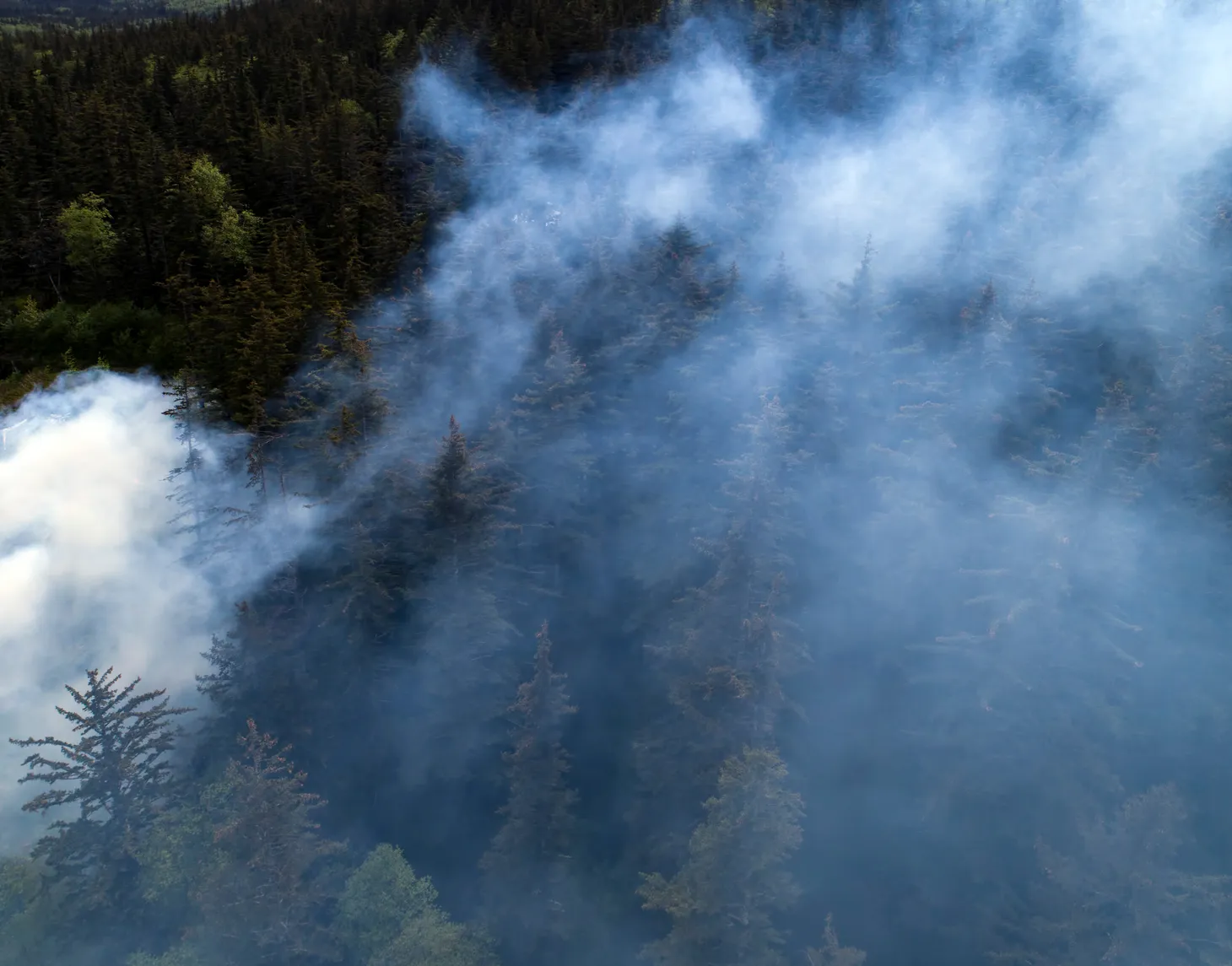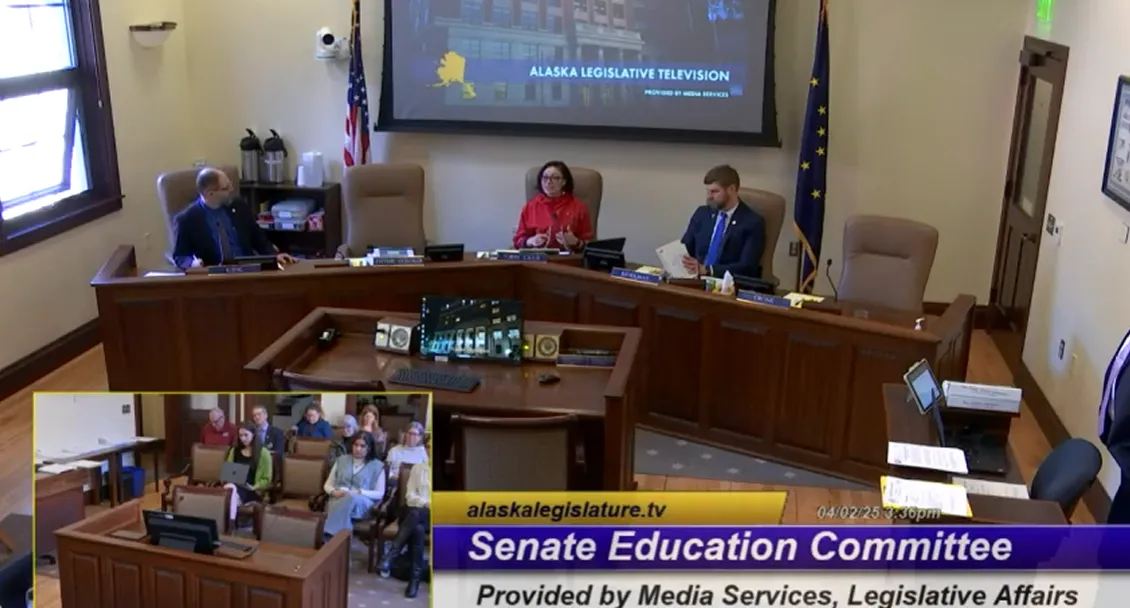Day 11: 'Dunleavy says they put money in and will continue to do so.'
At his news conference focused on charters and homeschools, Dunleavy insists he cares about all schools.
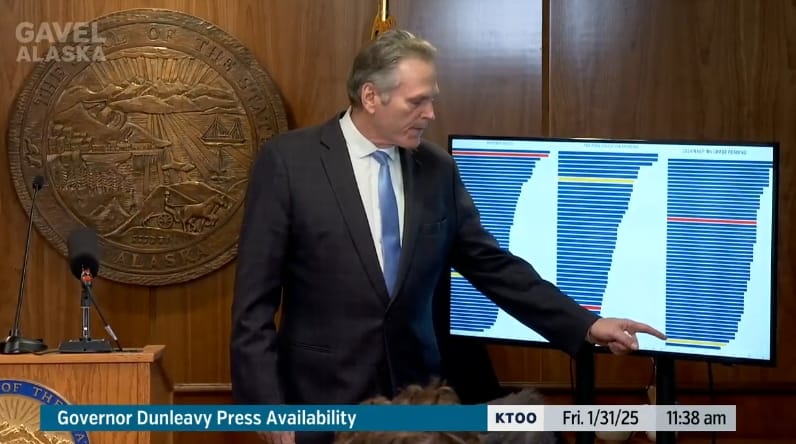
Happy Friday, Alaska. What a week it's been.
In this edition: The governor rolled out his omnibus education bill that, surprise, doesn't include a permanent increase to Alaska's per-student funding formula, known as the BSA. Instead, it has targeted funding increases that mainly go to boosting charter schools and home school students—areas of funding that have increasingly gone to subsidizing the education of wealthier, whiter students at private and religious schools under relaxed the Dunleavy administration's relaxed oversight. The slide into the pseudo-privatization of public education seems to be one of the governor's favorite things, next to grousing about media coverage, of which there was plenty. Meanwhile, the Dunleavy administration was pretty noncommittal about letting legislators see the long-overdue wage study at any point during this session, stymying the growing effort to pay teachers and other public sector employees a fair wage and benefits so they stop leaving in droves.
Current mood: 🤼
Dunleavy on schools: "Dunleavy says they put money in and will continue to do so."
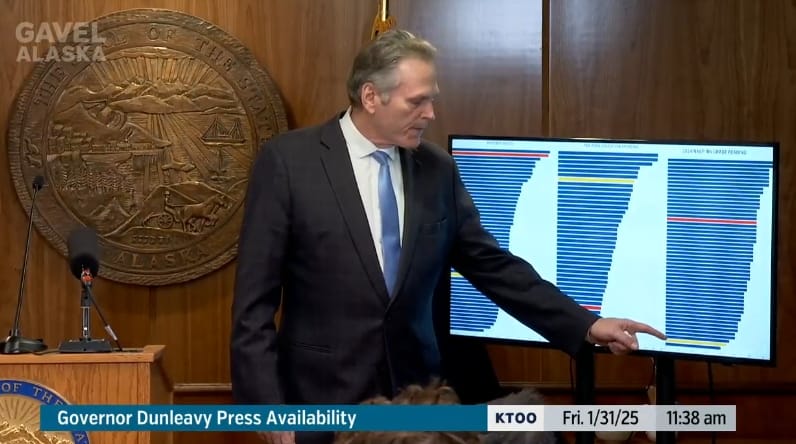
Gov. Mike Dunleavy delivered another my-way-or-the-highway news conference on education today, in which he insisted on pursuing right-wing education policies that have no traction with the Legislature's coalition majorities. His bill proposes no increase to the per-student funding formula, known as the Base Student Allocation, or BSA. Instead, it directs funding to a limited set of policy goals with $43 million for homeschool students, $31 million for career and technical training, $14.5 million for transportation, $22 million for reading in elementary schools and $4 million for residential schools. At a total price tag of about $105 million, it's less than a quarter of the $460 million proposal that drew overwhelmingly supportive testimony this week despite the governor's attempts to rally opposition.
Not only does the legislation fall well short of what coalition legislators and school advocates say is needed to stem the bleeding at school districts throughout the state, but it also links funding to specific policies like his three-year teacher bonus proposal that flopped last year, a ban on cellphones and an open enrollment policy allowing students to enroll wherever they like as long as there's space in the program. Legislators have argued against this move, noting that it would make passing either more tricky (which is probably part of the governor's calculation).
Dunleavy defended leveraging the underwhelming funding proposal for unpopular policy changes, accusing teacher unions and pro-school groups of resisting change and claiming that issues of race, wealth and funding aren't as tied to educational success as some think (which is not at all backed up by the research). Much of his presentation focused on Mississippi's educational gains, which conservatives have hailed as evidence you can make gains without spending much.
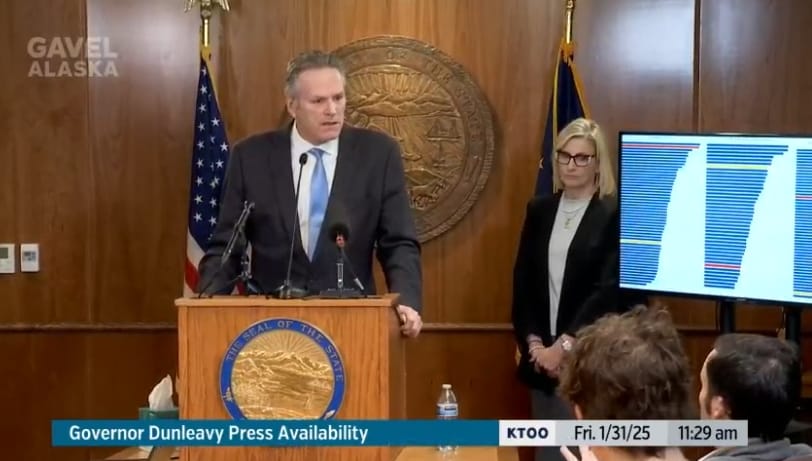
"I don't know how the special interests of 'No Change' are going to spin this, right? Because what you usually hear is, well, the reason they do well down there or they do well over there is they don't have to deal with poverty or the reason they do well down there, or they do well over there is they have more money in education, or it's a race issue," he said. "As a father of kids in the public school, as a father of kids that are tribal members and ANCSA corporation members, as a father whose kids went to school in rural Alaska, as young children, as a friend of folks in rural Alaska, I can tell you that we can do so much more."
Of course, this governor's actions don't align with any of that.
Last year, he vetoed what would have been the single largest permanent increase to the BSA because legislators refused to throw the doors wide open on charter schools, which followed on the heels of the Anchorage School District shutting down a charter program that was basically a cover for spending public funds on private and religious education (which is barred by the Alaska Constitution but supported by Dunleavy and promoted by his allies). It's hard to judge the educational outcomes of the charter and homeschool programs Dunleavy has boosted because a wide swath of those students opt out of standardized testing, but legislative analysis (shared by the ADN) shows that the graduation rate for homeschooled students is generally lower or much lower than other schools.
He's also struggled to provide legislators with evidence that his policy proposals will actually make a difference. He's leaned heavily on a study of Alaska's charter schools, even though the authors seemed alarmed that it was being used as a serious policy document with its several admitted limitations.
“I’m definitely saying don’t take it at face value,” said Bruce Baker, a University of Miami professor among the study’s four authors, told the Juneau Empire last year.
Yet, Dunleavy has continued to take it more than face value, suggesting that it's evidence Alaska's charter program is the best in the nation, a claim he made at his State of the State address. This would lead you to wonder why he's so hellbent on changing it by stripping away oversight and control from local communities and putting it in the hands of a board of education he appoints.
“If Alaska’s charter schools are as high performing as we hope they are — as they seem to be — then why would we change the system that gave us those schools?” said Himschoot, according to the ADN.
(It's at least partly because the Anchorage School District put the clamps on a charter that was funneling public school money into religious schools, violating the Alaska Constitution.)
But the one thing the governor seems to be more jazzed about than finding new and creative ways to funnel public funds into private and religious education is bickering about press coverage. He spent much of the meeting near-yelling about special interests (teachers) and how they just want more money (livable wages) and don't want to make changes (add to their already overloaded workloads), accusing the media of getting played (having normal human empathy).
"So, do me a favor, make the headline this: 'Dunleavy asked, 'Why it's just about the money,''" he said after grousing about everyone thinking he only cares about charter and homeschool students at his news conference, which was mostly about boosting charter and homeschools. "Can I pay you? I'll get a subscription to your newspaper if you put that headline up."

He returned to the suggestion later in the meeting after talking about how all the school closures occurring throughout the state are warranted because the population is declining.
"$99 bucks a year?" he said, facing the ADN reporter. "Headline: Dunleavy says they put money in, and they will continue to do so. I'll get my OMB lady to cut a check tomorrow if I see that."
Unhinged stuff.
Anyway.
Why it matters
Once again, don't let him tell you who he is; let him show you who he is.
Dunleavy offers no real compromise on education. His pitch is much less funding for much narrower purposes than this Legislature will ever approve. And all his griping about the state of the school system also ignores the fact that he's been governor for six years; he's had a chance to do something about it!
Also, it inspired this from Hello Alaska! podcast partner, Pat Race:
#akleg
— Pat Race (@pat.alaskarobotics.com) 2025-01-31T21:06:25.875Z
Follow the thread: The tail-end of Dunleavy's education presser
More coverage: ADN (which ended up going with: Gov. Dunleavy unveils legislation to boost Alaska homeschooling and charter schools, setting up a battle with lawmakers), Alaska Public Media
Dunleavy administration is noncommittal on wage study
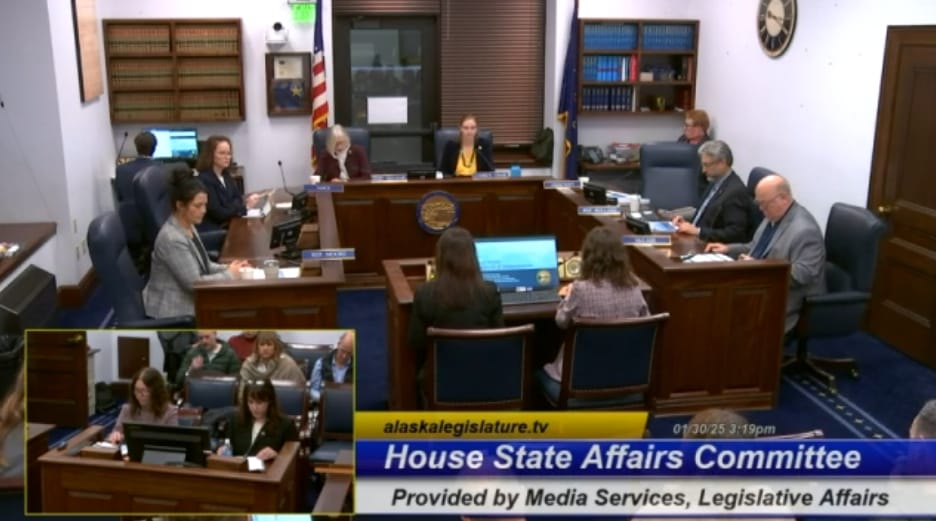
As the governor, legislators and other top political appointees are set to get automatic cost-of-living adjustments under the latest state salary commission's recommendation, Dunleavy administration officials were vague and noncommittal about when legislators and the public will get to see the results of a long-delayed million-dollar wage study. The private contractor was supposed to have the wage study complete and to the state by the end of June 2024, but the state amended the plan to include some updated salaries (contracts change regularly, so it's always a moving target) and better wage comparisons.
They claim it was necessary to ensure the report was accurate.
Most who aren't tightly allied to the governor read it as more of a delay tactic meant to run out the clock, so the findings can't be worked into this year's legislative session (meaning that the data will be out-of-date for the 2026 session). Department of Administration Commissioner Paula Vrana tried to settle those concerns during a House State Affairs Committee hearing on Thursday, where she said they wanted to get the study done as much as anyone and gave the legislators a target of late March for the state to receive the final report.
However, upon further questioning, she conceded that the state does not actually have a target date to release the report.
“I am not sure that we can make a commitment at this point on what those dates would be,” she said, noting that the state would have to review the report before releasing it.
That means the document will, at its earliest, be available at the tail end of this year's legislative session, if not after it altogether. Of course, this puts a hitch in the majority coalitions' goal of stemming the outflow of state workers that's left nearly every area of the public sector, from public safety to teachers to permit offices with high numbers of unfilled jobs. More than 16% of all state jobs are vacant, which several state agencies have conceded is undermining their ability to carry out their work. Meanwhile, several school districts have relied on foreign teachers and long-term subs to fill teacher vacancies.
At Thursday's hearing, legislators said the Dunleavy administration's lack of urgency and action on public sector compensation has been frustrating.
“Fundamentally, I'm trying to figure out how are we going to be able to make the decisions we need to make now when we're getting this information so late,” said Rep. Ky Holland, I-Anchorage. “I don't understand why we didn't have a preliminary report that could have been updated with a supplemental, and I don't know whether or not we're on track to actually see something in March.”
Vrana was generally dismissive of the concerns about missing this legislative session, saying that the study should set “a foundation for a longer-term conversation with the legislature, with the executive branch on the implementation, which I think is a whole separate and very robust conversation.”
Which doesn't sound promising.
Unless, of course, you're far-right Dunleavy ally Rep. Sarah Vance, R-Homer, who said unprompted that she was convinced by the hearing that there was no underhanded plan afoot to conceal wage data and stymie the legislative process.
"I think that gives me peace of mind that this isn't an intentional delay,” she said. "The public has been all astir around this as if there's been some controversy that there's something to hide."
The meeting was briefly interrupted when Republicans objected to hearing from Heidi Drygas, the executive director of the Alaska State Employees Association, which represents about 70% of the state's public employees. During a break, cameras captured Vance, Big Lake Republican Rep. Kevin McCabe and Wasilla Republican Rep. Elexie Moore grabbing their things and starting to walk out during a testy exchange about having to hear her testimony.

Ultimately, they stayed after Drygas agreed to keep her testimony strictly limited to the wage study.
She said the wage study is critical because the state is currently negotiating several contracts covering thousands of state employees, and it's worthwhile for everyone to know whether state wages are competitive. She also reiterated that the late-March estimate for the report to be delivered to the Dunleavy administration came well after when contracts needed to be approved for the upcoming budget.
"If the point of the salary study is to inform wages for state employees and our collective bargaining agreements are three years old, then getting that information after our wage information is due to the legislature is not very helpful to the members I represent," she said. "It's not helpful to the constituents that you represent. It's not helpful to the Legislature. It's not helpful to Alaskans at large. The whole point of the information is to inform whether or not we need to increase wages."
After the explanation, Rep. McCabe—who had been stewing, red-faced over her testimony—actually said, "Sure, fair enough."
Vance wanted to know why the ASEA wasn't regularly conducting its own million-dollar wage studies for its own use. Drygas said it's hard for them to periodically fund million-dollar wage studies, and that's why they had requested the Legislature fund the study in the first place.
"This is not the administration's salary study," she said. "This is the state's salary study."
Why it matters
I doubt we'll see that salary study anytime this session. While there was much talk about the end of March as the report's deadline, there were a lot of caveats along the way that finally ended with the confirmation that there wasn't a firm deadline for the report to actually be released to the public.
Take this comment from Commissioner Vrana, for example: "I can assure you that we are on track to receive a study that will be released at the end of March."
It should probably be read as, "I can assure you that we are on track to receive a study—that will be released—at the end of March."
Or, as the great, late Lionel Hutz put it on The Simpsons:

Also, if we haven't forgotten, the Alaska Supreme Court found that Team Dunleavy is known to operate with "abundant evidence of anti-union animus."
Stay tuned.
Follow the thread: The House State Affairs hearing on the wage study
More coverage: Juneau Empire, Dermot Cole, Alaska Public
My work from The Alaska Current and beyond
- Alaska campaign regulators slap anti-open primary groups with another round of hefty fines
- Dunleavy takes aim at the First Amendment with anti-protest bill
- Murkowski calls Greenland an ‘ally, not an asset’ as Trump fixation deepens
- Alaska House passes clean resolution opposing Denali name change, rejecting GOP attempts to soften message
- Bad winter getting you down? Hit the slopes in Lonely Mountains: Snow Riders
Weekend watching
This weekend is the WWE Royal Rumble, the most fun, silly and approachable pro wrestling event of the year. The event's centered around two battle royale matches where 30 wrestlers enter at set intervals to battle it out to be the last one standing for the opportunity to call their shot for Wrestlemania. It's all good fun with some big stories, throwback appearances and new debuts, making it for some of the best watching of the year. If you're wondering how pro wrestling can be so great, here's one of my favorite explainers to force unwitting friends into watching:
Have a nice weekend, and take care of yourself.
The Alaska Memo Newsletter
Join the newsletter to receive the latest updates in your inbox.


